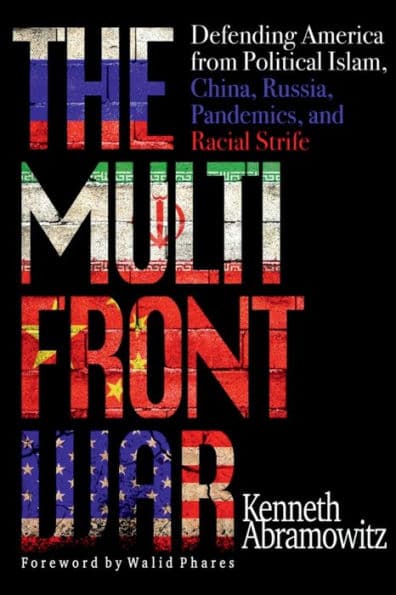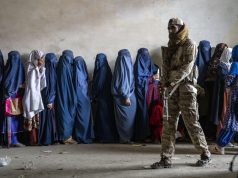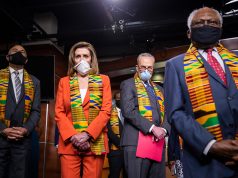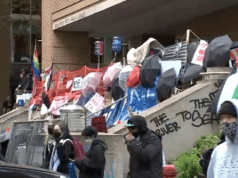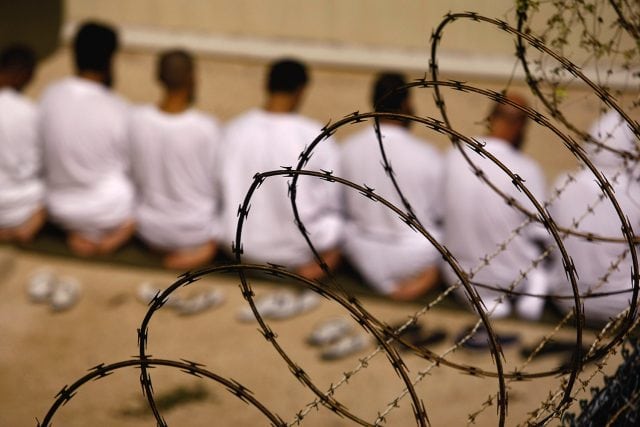
.
By Rachel Avraham
Iran is a multinational, multi-ethnic and multilingual country, with numerous different religions and cultures. The Azerbaijanis, Persians, Kurds, Arabs, and Baloch are the five main constituent nations of Iranian society. Although there are no official statistics to determine the number of non-Persian nationalities and ethnicities, according to provincial and regional divisions, they make up more than half of Iran’s population.
“Despite this variety, Iran’s constitution has formally and systematically marginalized non-Persian nations and violated the rights of most of the country’s population,” Mohammad Azad Salwati, President of Zagros Human Rights Center in Geneva, stated. “The Persian language, as the official language of the country, is imposed on other peoples, and they are obliged to study Persian only, and administrative affairs and state documents are all in this language. Although the origins of Articles 15 and 19 of the Iranian Constitution refer to the use of non-Persian languages in addition to Persian, no action has been taken to implement the articles mentioned.”
Salwati criticized the government which does not care about ethnic minorities in Iran and continues: “These peoples are completely ignored in the administration of the country. Most of the officials of the non-Persian regions are appointed and sent by the central government and most are not residents of these regions.”
Salawati noted that even Iran`s budget regarding ethnic minorities is discriminatory: “The allocation of the country’s budget is also not based on justice and equality. For example, in next year’s Iranian budget, Iranian Kurdistan; West Azerbaijan, Ilam, Kermanshah, Kurdistan and Lorestan have the lowest budgets of country.” Salwati concluded: “The scorched earth policy is practiced in non-Persian national areas. Its goal is demographic change and assimilation.”
Mohim Sarkhosh, the Head of Foreign Affairs for the Baluchistan Solidarity Party which is based in the UK, noted the four decades of human rights abuses in Baluchistan by the Iranian regime and said: “After they took over Iran, the Iranian sectarian regime institutionalized systematic discrimination against the Balochi people in every aspect of life, especially economic, educational and political. Since Balochis are Sunni Muslims, unlike the authoritarian regime, they are never vetted to hold high office even in their own mainland. The province of Balochistan is controlled and ruled by the IRGC (Islamic Revolutionary Guard Corps) which commits despicable crimes against the Balochi people on a daily basis. Since the beginning of this year, at least 55 Balochi prisoners have been publicly executed, and more than 46 Balochi fuel-carriers have been shot and killed by the IRGC members.”
According to official figures from the provincial authorities, approximately 120,000 Balochi people lack the Iranian birth certificates and citizenship. In other words, they do not have access to public healthcare, cannot attend public schools and have no civil rights. Although they are supposed to be considered and treated as Iranian citizens, many of them are routinely arrested by the Iranian police and deported to neighboring Afghanistan and Pakistan. It has been reported that approximately 30,000 stateless Balochis live in Zahedan, the capital city of Sistan province.
“Recently, a 25-year agreement has been signed between the Iranian regime and the Chinese government regarding Balochistan’s main ports, including Chabahar, Jask, Konarak, and Tis without any consultation with or permission from the Balochi people who are historically and legally the main owners and stakeholders of Balochistan. According to this reprehensible settlement with the Chinese government, the regime intended to build settlements and military bases on the southern coast of Balochistan,” Sarkhosh said.
Sarkhosh looks at the other dimensions of the regime’s plans in Balochistan to change the demography of that region and added: “Furthermore, the sectarian regime of Tehran is planning to relocate more than five million people from different provinces to Balochistan. The main goal of the regime is to marginalize, alienate, and undermine the Balochi ethnicity, culture, language, history, and people in Balochistan. In order to proceed with its plot to construct the new settlements in coastal areas of Balochistan, the regime has confiscated Balochi people’s lands without providing financial compensation to the owners. On several occasions, it has been documented that the Iranian authorities have destroyed Balochi people’s homes to force them out.”
According to the official reports from the Iranian authorities, well over 62,000 students have dropped out of primary education due to extreme poverty, a lack of teachers, and the poor-quality of education in Balochistan. Additionally, difficulty in coping with Persian, or Farsi, as the only medium of instruction in schools, has led thousands of Balochi children to either drop out of school completely or suffer significantly throughout their primary and secondary education.
Sarkhosh then gives some data and statistics about the quality of education in Balochistan and concludes: “It is officially documented that last year, nearly 13,000 Balochi children were unable to commence their education due to the above-mentioned reasons. The quality of education and educational institutions in the cities of Balochistan is significantly low, compared to the Persian-speaking cities due to the insufficiency and inadequacy of teachers and educators. It was reported that the province lacked 12,000 teachers the previous school year. In addition, 40% of schools in Balochistan lack standard buildings, and students are forced to study in tents.”
“If I as an Iranian woman who was born and grew up in a Muslim family want to talk about human rights, specifically women’s rights, I must stress the truth that women’s life is very unbearable and very complicated most of the time,” says Shabnam Shajarizadeh, a human rights and women rights activist based in the US. She added: “There are many people with different cultural ethnic and religious background such as Kurds, Balouch, Ahwazi Arab, Baha’i, Jewish and Christian living among the Shia in Iran. Since the beginning of time, all these groups have their own issues and difficulties. But for women living in Iran, the difficulties are even worse.
“For example, child forced marriages, honor killings, compulsory hijab, and so much more are some of the issues faced by Iranian women,” Shajarizadeh stressed. “Unfortunately, there are no consequences for these wrongful doings. Iran is the scene of multiple human rights violations. It’s the country that executes the highest number of people per capita in the world.”
According to Shajarizadeh, “Iran has imprisoned scores of women for removing their forced hijab in public and some of them were sentenced to more than 20 years. Not only that, they have also imprisoned the mothers of these girls because they were protesting against the outrage their daughters faced.”
However, she noted that not just women’s rights activists are repressed: “Iran has imprisoned scores of environmentalists (and killed one of them under torture). They were accused of endangering national security. Many dervishes (those who want to advance a peaceful version of Islam), Baha’is, and converts to Christianity are in prison. All because of their beliefs. Homosexuality remains a crime in Iran. Every year, scores of homosexuals flee Iran because they’re scared of being tortured, forced to endure sex-change operations, or lead a miserable life of seclusion.”
“In Iran we have many prisoners of conscience including lawyers, teachers, and writers,” she added. “We ask democratic countries to stop enabling our oppressors. They should instead stand in solidarity with human rights defenders in Iran and the Iranian people to challenge the oppressive Iranian regime. Even Iran’s Nobel peace prize laureate Shirin Ebadi has said reform is not possible with a government willing to kill those who oppose it. We need to be clear that we are dealing with a totalitarian theocracy whose laws are rooted in the 7th century.”
“Iran’s regime is an ideological religious regime that makes up the core of government and everything is made based on this pillar,” Sirwan Mansouri, a Kurdish journalist based in the Middle East, stressed. “In this kind of regime, human rights do not have any place.”
He believes that the government sees itself as a representative of Allah with divine law and does not feel the need to be responsive to the people: “If anyone looks at the past four decades of this regime’s rule, it will expose that this regime has been busy with capturing, killing, torturing, and executing people without any care for human rights and the international community.”
According to Mansouri, the mullah’s regime is medieval in its outlook for they “rule the people according to orders from Allah because they view themselves to be successors of the Prophet Muhammed and their constitution is based on the Quran and Sharia, so human rights have no place in such an atmosphere.” Considering this, Mansouri stressed: “The way that the international community behaves towards this regime is completely wrong, because they do not know the nature and essence of this regime. As the regime considers minorities in Iran to be second-class citizens, they behave worse to them. According to the special commissioner for human rights in Iran, about half of executions in Iran are of Kurds, while they make up just one tenth of the country’s population. The condition is also precarious for Arabs, Baluchs, Azerbaijanis, and so on.”
Mansouri believes that the West should change its interaction with regime and concluded: “Western countries should concentrate on human rights more than political and economical issues in interacting with this regime, because what can change the society and make Iran a part of international community is to respect human rights and universal values for human rights is the way to respect people. In contrast, politics and the economy are the tools of a dictatorship government to suppress free-thinking human beings.”
Sources:
https://cdn.asriran.com/files/fa/news/1400/9/23/1311042_878.jpg
http://en.parliran.ir/UploadedData/previmages/iran-parliament_English_SHR01.pdf
https://www.amnesty.org/en/location/middle-east-and-north-africa/iran/report-iran/
https://worldcoalition.org/2021/03/12/widespread-and-systematic-violations-of-human-rights-in-iran/
https://www.hrw.org/world-report/2020/country-chapters/iran#
https://www.iranhumanrights.org/category/issues/
 Rachel Avraham is a political analyst working for the Safadi Center for International Diplomacy, Research, Public Relations and Human Rights, which is run by Mendi Safadi, a former Likud Candidate for the Knesset and a former chief of staff of former Israeli Communication Minister Ayoob Kara. Since 2012, she has been working as an Israel-based journalist and writer, covering Iran, Kurdistan, Turkey, Iraq, Syria, the Israeli-Palestinian conflict and other developments in the greater Islamic world.
Rachel Avraham is a political analyst working for the Safadi Center for International Diplomacy, Research, Public Relations and Human Rights, which is run by Mendi Safadi, a former Likud Candidate for the Knesset and a former chief of staff of former Israeli Communication Minister Ayoob Kara. Since 2012, she has been working as an Israel-based journalist and writer, covering Iran, Kurdistan, Turkey, Iraq, Syria, the Israeli-Palestinian conflict and other developments in the greater Islamic world.
Her articles have appeared in the Washington Times, the Hill, Front Page Magazine, the Daily Wire, the Christian Post, the Baltimore Jewish Times, the Jerusalem Post, Israel Hayom, Ahval and many other publications across the globe. She received her MA in Middle Eastern Studies from Ben-Gurion University. She got her BA in Government and Politics with minors in Jewish Studies and Middle Eastern Studies from the University of Maryland at College Park.
Ken`s new book The Multifront War is now available in 190 countries via Amazon and also on BNs in the US. Buy it now!
.
.
.


